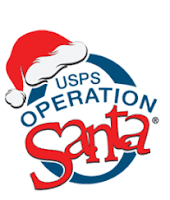In this episode - Santas Address – Update . . .
Can you feel the holiday spirit in the air? It's all around us! You can see it in the numerous Christmas specials in our inboxes, the stores that have been twinkling with decorations since September, and the jolly old man, Santa, who's popping up in TV commercials everywhere. Speaking of Santa, don't forget to address this year's letter correctly as you prepare your wish list. But first, let's take a trip down memory lane and learn some fascinating history together.
Did you know children have been sending letters to Santa for longer than the United States Postal Service (USPS) has existed to deliver them? However, today, they’re far more likely to get a response if you include the correct address.
In early America, children’s holiday wish lists were often written out and left by the fireplace or burned in hearths, with the belief that the ashes would rise through the chimney and out to the holiday helper himself. Today, there’s no fireplace necessary — just a stamp — since the United States Postal Service gave Santa Claus his address: 123 Elf Road, North Pole, 88888.
After the creation of the Postal Service in 1775, letters to Santa flooded mailboxes; local postmasters would sometimes intercept the mail and respond to children themselves (though this is technically mail fraud, most postal workers considered the deed an act of kindness and looked the other way). Eventually, a specific postal route for thousands of Santa letters became a problem for real-life delivery workers. By 1907, the number of unanswered letters bogged down the Postal Service’s dead-letter office (the home for unclaimed or undeliverable mail), and many ended in incineration. So, the country’s postmaster allowed post offices to give Santa letters to generous individuals and charitable organizations, who then answered letters and delivered gifts.
Dubbed Operation Santa in 1912, the program has continued for over a century. It’s gotten a modern update, however: Wish lists from children and adults are anonymized and digitized, then uploaded to the USPS website, giving holiday do-gooders a chance to play Santa and reply with the kindness of a surprise gift.
Here's how it works – Click – Send a Letter to Santa.
- Download one of the four PDF letter templates. (There’s a very cool Christmas tree letter).
- Craft your letter to Santa.
- Then, get an envelope from your parents – include your full Name, Return Address, and apartment number in the upper left corner.
- Attach a First-Class™ stamp in the upper right corner.
- Address your letter to the following:
Santa
123 Elf Road
North Pole, 88888
Drop it in your local mailbox by December 11th.
(P.S. Friends, neighbors, and generous folks) – Spread joy this holiday season by adopting a letter. Adopter registration is now open, and the letters are posted starting November 20th.
Don't miss out – Believe in Santa – make a child's holiday season extra special – and let the magic begin!
I’m Patrick Ball. Happy Holidays! See you in the next episode.


Comments